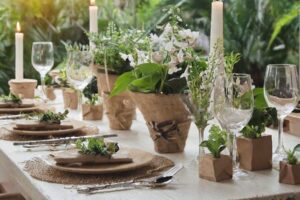Latest Posts Widget

Planning a wedding is an exciting journey that culminates in...

Selecting the perfect engagement ring is a momentous...

Planning a wedding is an exciting journey filled with...

Planning a Valentine’s Day wedding? As the day of love...

Simple Fall Wedding Dessert Idea Pumpkin is the flavor of...

Guest Post by Stan Popovich Some people wonder what it takes...

The importance of hiring a professional photographer and...

After the time spent searching, trying on, and altering the...

Featured Vendor: Dream Celebrations Meisha Pigford, the WOW...

A wedding ceremony is the start of something new and fresh...

Featured Vendor: Chelsea Menswear & Tuxedos There is...

Featured Vendor Event planners and designers learn business...

Even when taking precautions, couples may not expect the...

Many old traditions and wedding trends have been refashioned...

A wedding is one of the most precious moments in a...

Featured Vendor: Weddings To Be An interview with the owner...

Featured Vendor: James Ralph Agency For better or for worse....

An important lesson the past few years have taught us is how...

Are you looking for creative ways to add world cultural...

Guest Post by Darby Reynaert How much do you need to buy a...

Guest Post by TeShayla Coates Getting married to the person...

Featured Vendor: Bavarian Inn Lodge Time-honored...

Featured Vendor: The DirectHer Not all wedding planners are...

Featured Vendor: Hunter Art Studio Hire a caricature...

It’s pretty amazing to realize what all goes into...

Metro Detroit 2021 Average Wedding Expense Due to COVID19,...

No wedding would be complete without the iconic bridal...

Wedding Industry Businesses Celebrate Black Love with Motown...

Have you checked out Bed Bath & Beyond recently? If you...

Have you heard? Having a night out with friends at a...

Coffee recipes to create for your your next gathering,...

At-home Wedding Planning During COVID Due to COVID gathering...

When is a box no longer just a box? When it is a box made by...

Guest Post by Mary Aspen Richardson Moving is an emotionally...

Content provided by BPT For most people, 2020 is a year of...

Featured Vendor: Roses R Red, Inc. 2020 is a year that...

Content is provided by NewsUSA. Turns out that...

Planning an Outdoor Wedding Reception During the Days of...

Let’s face it. The covid-19 pandemic has caused many...

Featured Vendor: Matrix Global Travel If you love to travel,...

Customers are the winners as businesses reopen after...

The count-down is on! Couples are gearing up to have their...

Metro Detroit is a great place to get married. From...

It finally happened! You and your significant other decided...

Money management and building long-term financial health is...

It’s not uncommon for couples to have questions before...

Wedding Expense Insights for 2020 Wedding Planning Let’s...

Ready to begin planning for your big event? Do you know what...

Guest Post by Susan Harris No matter, a bride wants to look...

Finding the ideal place for a wedding and reception...

Guest Post by Tonya Williams As the weather has gotten...

By Bradi Showler We spend copious amounts of time finding...

Featured Vendor: James Ralph Agency, Inc Have no fear....

Detroit Wedding Day is honored to have had the opportunity...

Add a Little Motor City Love to Your Wedding If you’re...

Featured Vendor: Green Olive Soaps A quote attributed to...

Content provided by BPT Whether you are planning a bridal...

Featured Vendor: Matrix Global Travel Don’t be cheated out...

Featured Vendor: Bellissima Bridal Salon It’s common...

Guest Post by Tonya Williams It’s the day that many women...

The tables were set. The chairs were aligned. The...

When it comes to fashion, there are no hard and firm rules....

The team at HiCharlie.com shares several ideas how to make...

Featured Vendor: Lawson’s Video Production If...

Guest Post by Cadine Vernon Wedding favors are a tale as old...

Featured Vendor: Flawless Med Spa Let’s face it. If given...

Featured Vendor: The DirectHer It is safe to presume that...

Featured Vendor: Jacob Matthew Jewelers When it comes to...

Featured Vendor: A&A Flowers & Gifts of Oxford...

The best time to have a bridal shower and how to make it a...

By Diane Gale Andreassi Wedding dreams really do come true...

Metro Detroit Local Wedding Spending Trends At the time of...

Love is about small, kind gestures shared with your special...

The B.R.I.D.E. of Wedding Planning Guest Post by Lorri Lewis...

Author of Post: Lorri L. Lewis Courtesy of Pexels...

by Diane Andreassi Advertorial John Darakjian, an Armenian...

Featured Vendor: J&S Portrait America Portrait of Love...

Feature Blog Author of Post: Chauncey Gardner You are...

Photo courtesy of Getty Images Most relationship experts...

Aside from the excitement of marrying your true love, you...

Guest Author: Alice Robertson When it comes to planning...

Photo courtesy of Getty Perfect Popcorn for Every...

A wedding day is filled with symbolic tradition, from varied...

There is a magical boulevard situated behind the stately...

Lorri Lewis, the owner of The DirectHer, an event consulting...

Successful Independent Sabika Jewelry consultant, Rhonda...

CLICK HERE TO LEARN MORE ABOUT THIS CLIENT. Click here to...

Author of Post: Jackie Williamson

Top 2018 Wedding Trends The Evening On this 21st day in...

The Art of Wedding Photography Who is Angelo Simon? “I’m...

Before you hire a photographer to take your wedding...

Author of Post: Imani Henderson While some traditions...

Author of Post: Choya Jordan Studies report that there were...

Couples make their wedding day dreams come true By: Diane...

Author of Post: Clarissa Fonseca Interviewing potential...

Author of Post: Kate Storey It can be tough to find...

Area boutiques help brides find the right dresses By Diane...

THE MASONIC TEMPLE HAS ROOM FOR YOU For those who are...

Tips for Attending a Wedding Show If you are getting married...

The Man Behind the Camera Lens “I’ve been shooting...

Katherine’s Catering – The Heart of Your Event Every...

Author of post: Desiree Marion Creating the perfect...

Elizabeth’s Bridal Manor: The Royal Treatment If you...

NEW DRIP CAKE TREND MAKES WEDDING GUEST DROOL You may have...

Pinterest 2017 Wedding Fashion Trends It’s your big day...

VENDOR FEATURE We recently had the pleasure of visiting...

Author of post: Imani Henderson Snapchat geofilters are...

Author of post: Desiree Marion Is “Regal-ness” even...

Will you marry me? You have been waiting to hear those...

Posted on March 26, 2015 by Detroit Wedding Day We know that...

Posted on April 9, 2015 by Detroit Wedding Day While...

Today, we’re going to talk about simplifying your wedding...

When it comes to wedding photography, many brides would...
After you say “I do,” sometimes the work isn’t...
Here’s what we have for you today: a wonderful bridal...
Let’s face it, many brides are more interested in what the...
When it comes to choosing a wedding venue, many different...
There are plenty of unique centerpiece ideas for your...
Posted on September 11, 2015 by Detroit Wedding Day...
Posted on September 8, 2015 by Detroit Wedding Day Every...
Whether you have a large family, or a lot of friends with...
Posted on August 31, 2015 by Detroit Wedding Day We all have...
Posted on August 11, 2015 by Detroit Wedding Day What...
Posted on August 7, 2015 by Detroit Wedding Day Creating a...
Posted on August 4, 2015 by Detroit Wedding Day We all want...
Posted on July 16, 2015 by Detroit Wedding Day Interview:...
Today, we are going to talk to you about BridesMaid...
Posted on March 28, 2015 by Detroit Wedding Day An interview...
There are many different options when it comes to picking...
Posted on April 7, 2015 by Detroit Wedding Day Formerly...
Posted on April 2, 2015 by Detroit Wedding Day Ever wondered...
Posted on March 22, 2015 by Detroit Wedding Day Sometimes,...
Posted on March 19, 2015 by Detroit Wedding Day Interview: ...
Posted on February 28, 2015 by Detroit Wedding Day...
Posted on February 20, 2015 by Detroit Wedding Day It’s a...
Sometimes, it’s really hard to find the perfect gift to...
Posted on February 20, 2015 by Detroit Wedding Day Welcome...























































































































